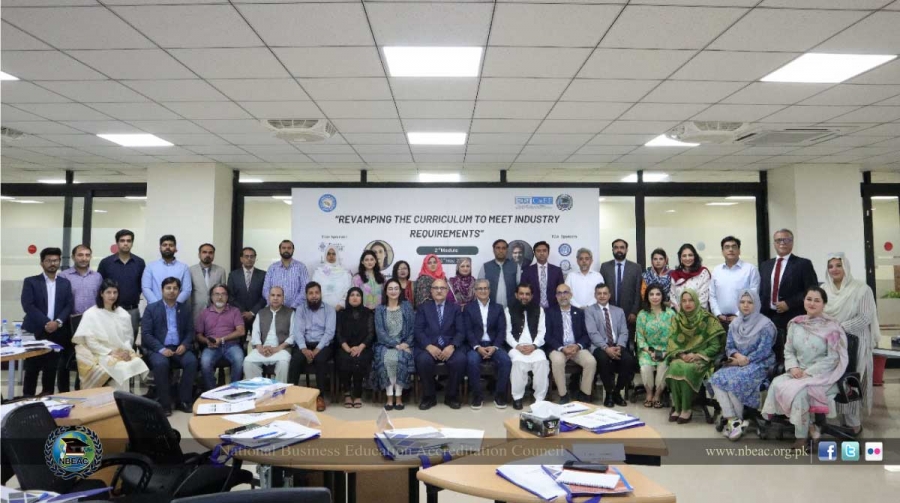Workshops
Workshop "Revamping the Curriculum to Meet Industry Requirements"

|
Workshop - “Revamping the Curriculum to Meet Industry Requirements” |
|||
|
Introduction: |
|||
|
The multi-module training, "Revamping the Curriculum to Meet Industry Requirements”, is designed to foster industry-academia partnership for updating curriculum in light of changing global trends and industry needs. The first one-day online module is based on peer-to-peer learning, during which academicians will share selected course outlines. Additionally, a few schemes of study as per HEC UG 2023 will be discussed. The second module is a two-day discussion and training session in Islamabad, during which senior industry representatives will share their views on the future of business education. The course content of selected courses will also be discussed in detail through academic peer-to-peer and academia-industry discussions. The third module, also online, will focus on academicians discussing any specific changes in their own outlines, teaching material, and teaching pedagogy in light of the discussions from the previous modules. |
|||
|
Learning Outcomes: |
|||
|
The learning outcomes of the training include:
|
|||
|
Who Should Attend: |
|||
|
Deans, HODs, Cluster Heads and Senior Faculty Members. |
|||
|
Facilitators: |
|||
|
|||
|
Notes: |
|||
** If unforeseen circumstances occurs during the workshop and one day before the scheduled workshop, NBEAC will not refund the registration fee. |
|||
Islamabad, Pakistan – May 14, 2024 – NBEAC in collaboration with FAST NUCES Islamabad, a leading institution in Pakistan's educational landscape, is hosting a groundbreaking workshop aimed at reshaping academic curricula to meet the dynamic needs of the industry. The workshop, spread over three modules, commenced on April 30th, 2024, with subsequent sessions scheduled for May 14th, May 15th, and May 28th, 2024.
The workshop, titled "Revamping the Curriculum to Meet Industry Requirements," brings together esteemed leaders from academia and industry to address critical gaps between educational offerings and industry demands. Participants are engaged in a series of collaborative sessions designed to analyze existing curricula, explore innovative teaching methodologies, and forge meaningful partnerships between academia and industry.
Renowned CXO-level speakers from diverse sectors have been invited to share their insights and experiences, including Aamir Ibrahim- CEO of Jazz, Adeel Anwer- CEO of Zephyr Consulting, Ali Ibrahim- Vice President of Marketing and Communications at Hashoo Group, Fahd Khawaja- General Manager & Head of Strategy Inputs Vertical- HBL Zarai Services, Fathema Zuberi- HR Director at Unilever Pakistan Limited, Haroon Kanth- Country Director at Teradata, Mohammad Khuram Idrees- CEO of Icarus Incorporated, Mohsin Nishat- Group CHRO of Zaman Group of Companies, Mujeeb Zahur- Managing Director at S&P Global, Murtaza Abbas- Joint Director of Investor Education Department at SECP, Saquib Ahmed- Managing Director of SAP Pakistan, Afghanistan, Iraq, and Bahrain, Sarwat Ahson- Executive Director of CFA Society, Pakistan, Mohammad Shoaib- Director CFA Society and Jamshed Inam Sheikh- Group Head HR at Army Welfare Trust.
The workshop aims to achieve several key learning outcomes, including analyzing and critically evaluating existing curricula, teaching materials, and pedagogical approaches in business schools through academic peer-to-peer and academia-industry discussions. Formulating actionable plans for curriculum enhancement, including updating course content, adopting new teaching methodologies, and integrating interdisciplinary perspectives. Developing strategies for fostering industry-academic partnerships and engaging with corporate leaders to ensure curriculum relevance and industry alignment and fostering a community of practice among senior faculty members, deans, and CXOs to facilitate ongoing knowledge sharing, collaboration, and support in advancing business education nationwide.
The workshop was exclusively sponsored by The University of Lahore, SZABIST Islamabad, Institute of Business Management, Forman Christian College, University of Central Punjab, DOW University of Health Sciences, Lahore Garrison University, NUML Islamabad, University of Loralai, and Sindh Madressatul Islam University Karachi.
Powered by iCagenda
About NBEAC
NBEAC has three main functions: accreditation, training and networking. In its accreditation function, it develops and implements standards to improve the quality of business education in Pakistan. In its training function, it provides opportunities to faculty and managers to learn about quality standards and related matters. In its networking function, it provides a forum for business education professionals to learn from each other through conferences and seminars.


